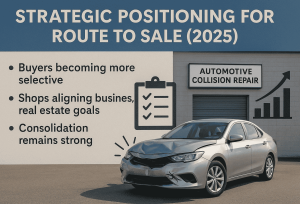Strategic Positioning for Route to Sale (2025)
Background
The automotive collision repair industry has been undergoing steady consolidation over the past decade, with large Multi-Shop Operators (MSOs) and private equity investors acquiring independent shops. By 2025, this trend has reached a point where strategic preparedness is no longer optional—it is essential for independent shop owners considering a sale.
Pointe Automotive, a consulting and advisory firm specializing in collision repair businesses, observed that 2025 is shaping up to be a pivotal year. The dynamics of buyer selectivity, real estate considerations, and operational efficiency now directly impact whether a shop can sell for its true market value or face discounted offers.

Key Observations
-
Buyer Selectivity at an All-Time High
-
Consolidators and MSOs are no longer acquiring indiscriminately.
-
They focus on profitable shops with scalable operations, clean financials, and consistent KPIs such as cycle time, CSI (Customer Satisfaction Index), and DRP (Direct Repair Program) relationships.
-
Shops without proper documentation or with inconsistent profitability are facing reduced valuations.
-
-
Alignment of Business and Real Estate Goals
-
Buyers prefer packages where the collision repair business and real estate are strategically aligned.
-
Some shop owners attempt to sell the business while retaining the property, but this can complicate deals and lower interest.
-
Pointe Automotive emphasizes that aligning lease terms, ownership structures, and property readiness can maximize valuation.
-
-
Consolidation Momentum
-
The pace of mergers and acquisitions (M&A) is strong, but the gap between well-prepared and under-prepared sellers is widening.
-
Shops that are strategically positioned—modernized equipment, digital estimating systems, and ADAS calibration capabilities attract higher premiums.
-
-
Timing is Crucial
-
With industry growth forecasts steady but cost pressures rising (labor shortages, ADAS repair costs, supply chain issues), 2025 is seen as a window of opportunity.
-
Waiting too long could mean lower valuations as competition increases and insurance reimbursement models tighten.
-
Industry Trends Shaping This Case
-
MSO Expansion: Firms like Caliber Collision, Gerber, and Crash Champions are actively pursuing acquisitions to expand regional footprints.
-
Private Equity Interest: Investors view collision repair as a stable, recurring revenue sector, especially given vehicle accident trends and high-tech repair demands.
-
Real Estate Valuation: With rising property values in prime urban and suburban areas, shops with well-situated facilities can negotiate stronger deals.
-
Technology Investment: Buyers prioritize shops that have already invested in ADAS calibration, OEM certifications, and digital estimating platforms, reducing their need for immediate upgrades post-acquisition.
Strategic Recommendations from Pointe Automotive
-
Audit and Optimize Operations: Standardize processes, clean up financial reporting, and improve efficiency metrics before initiating sale talks.
-
Align Business + Property Strategy: Package business and property together or structure leases to make deals more attractive.
-
Invest in High-ROI Upgrades: Adding ADAS recalibration capabilities, OEM certifications, or digital tools can yield multiples on valuation.
-
Engage Advisors Early: Industry-focused advisors like Pointe Automotive help shop owners position their businesses for maximum value and navigate negotiations effectively.
Implications
-
For Sellers: Shops that fail to prepare strategically risk being overlooked or undervalued, especially in competitive regions.
-
For Buyers: Selectivity ensures acquisitions are sustainable and aligned with long-term market trends.
-
For the Market: Consolidation will continue, but the “premium” will only go to shops demonstrating operational maturity, real estate alignment, and tech readiness.
Get More Insights: https://www.precedenceresearch.com/